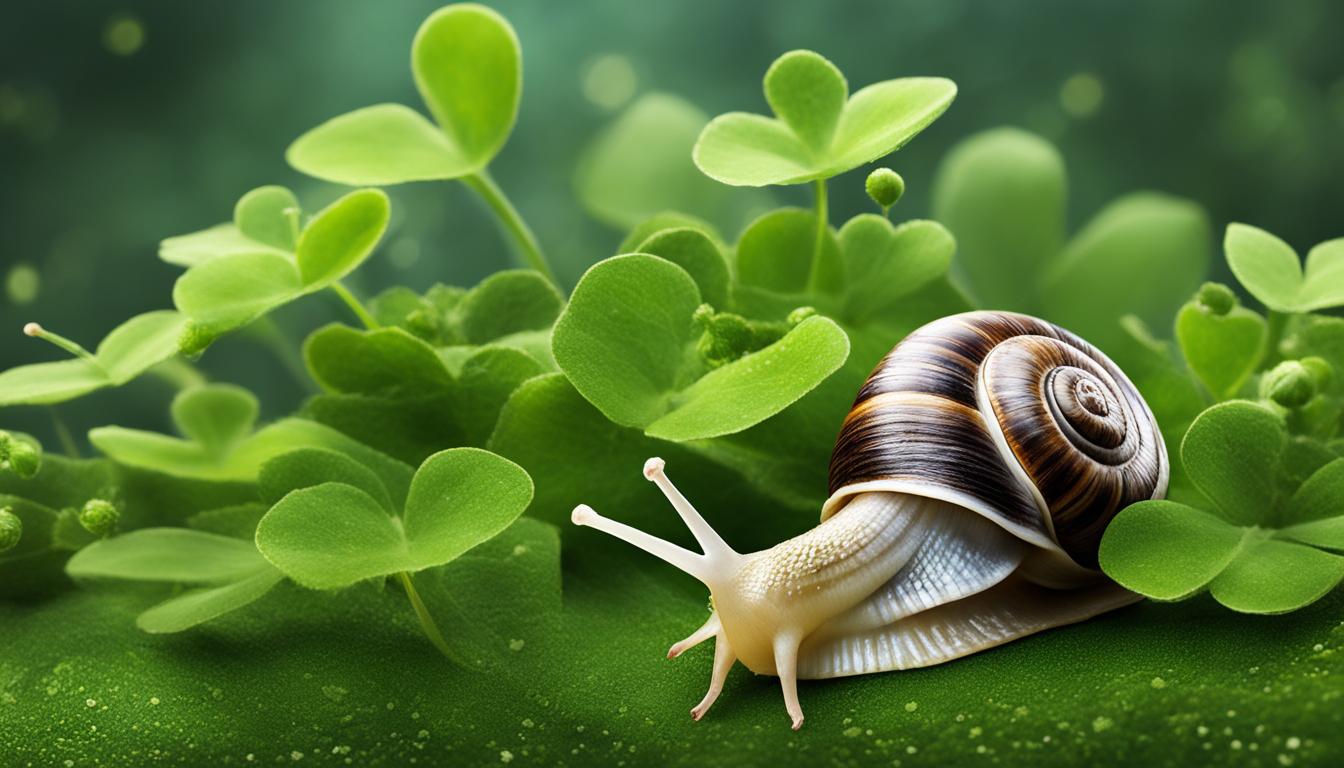For centuries, snails have been the subject of various beliefs and superstitions. While some cultures believe that snails bring good luck and fortune, others associate them with bad luck and misfortune. In this article, we aim to uncover the truth behind these beliefs and explore the symbolism of snails in relation to luck.
We will examine the history of snails in superstitions, the perception of snails as lucky creatures, and the cultural variations in snail beliefs. Additionally, we will delve into the scientific studies on snails and luck, explore their significance in spiritual and symbolic contexts, and discuss personal experiences and anecdotes related to snails and luck.
Whether you believe that snails are good luck or bad luck is subjective and varies across different cultures and personal beliefs. Nevertheless, the symbolism and significance of snails in relation to luck are fascinating.
Key Takeaways
- Snails have been subject to various beliefs and superstitions throughout history.
- Some cultures view snails as lucky creatures, while others associate them with bad luck and misfortune.
- Snails hold great significance in spiritual and symbolic contexts.
- Personal experiences related to snails and luck can vary widely.
- Snails also serve as important environmental indicators.
Snails in Superstitions throughout History
Snails have been a part of human culture and superstitions for centuries. In some cultures, they are considered symbols of good fortune, while in others, they represent bad luck or even death. Let’s take a look at some of the most common beliefs and superstitions surrounding snails.
The Snail as a Symbol of Slow Progression
In many cultures, snails are associated with slow progression due to their slow-moving nature. This trait has led to the use of the snail as a symbol of slow progress or delay in certain circumstances. For example, in African folklore, snails are seen as the ambassadors of procrastination and are often used to teach children the importance of doing things in a timely manner.
Snails and Healing Powers
There are also many beliefs surrounding the healing powers of snails in various cultures. In ancient Greece, snails were used in medicine to help heal wounds and treat skin conditions. In some African countries, snail slime is believed to have healing properties and is used to treat cuts and burns.
The Connection Between Snails and Rain
Snails are also believed to have a connection with rain. In some cultures, the appearance of snails after a rainfall is seen as a sign that more rain is to come. In other cultures, snail shells are used in rainmaking rituals.
Snails as a Sign of Death
Despite their association with healing and good fortune in some cultures, snails have also been associated with death and bad luck in others. In ancient Rome, snails were often used in funerary art to symbolize the transience of life and the inevitability of death. In some European countries, the sound of a snail shell cracking is believed to be an omen of impending death.
Snail Symbolism in Art and Literature
Snails have been depicted in art and literature for centuries, often with symbolic significance. In the painting “The Temptation of Saint Anthony” by Hieronymus Bosch, a snail is shown crawling over the saint’s hand, representing the slow but steady progression of sin. In the children’s book “The Tale of Mrs. Tiggy-Winkle” by Beatrix Potter, a snail is shown as a helpful character.
“The snail doesn’t produce its own shell; it borrows one from another creature. Sometimes, in life, we must learn to adapt and make the best of what we are given.”
The Perception of Snails as Lucky Creatures
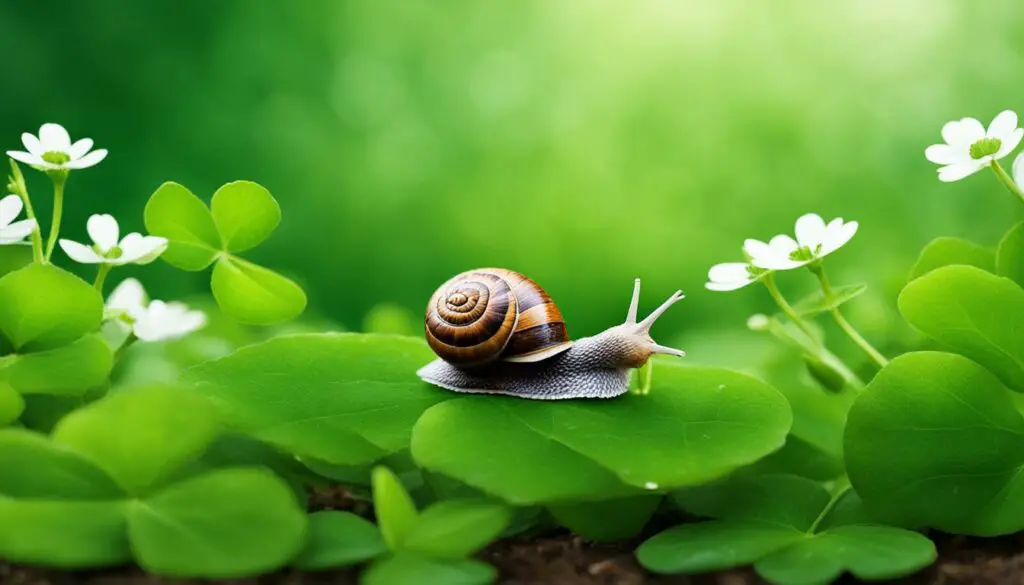
Snails have been considered lucky creatures in many cultures around the world. Their slow, steady pace and ability to retract into their shells have led many to view them as symbols of perseverance and protection.
In some cultures, the spiral shape of a snail’s shell is thought to represent the cyclical nature of life and the universe, while others see the snail as a representation of the moon and its phases.
| Culture/Region | Beliefs about Snails and Luck |
|---|---|
| China | Snails are associated with wealth and prosperity. It is believed that their slow, steady pace allows money to accumulate over time. |
| Greece | In ancient Greece, snails were associated with the god Hermes, who was known for his cunning and speed. As such, snails were seen as symbols of intelligence and ingenuity. |
| Africa | In some African cultures, snails are believed to bring fertility and good luck to marriages. They are also associated with rain, which is seen as a sign of abundance and prosperity. |
Snails have also been used in various cultures as a form of divination or fortune-telling. In ancient Rome, for example, wealthy citizens would consult a snail oracle to predict future events. The snail was placed in a circle with letters of the alphabet, and the letter it stopped at was thought to reveal the answer to the question.
Overall, the perception of snails as lucky creatures is deeply ingrained in many cultures and has become part of their folklore and mythology. While there may not be any scientific evidence to support these beliefs, they continue to hold significance for many people.
Snails and Bad Luck Beliefs
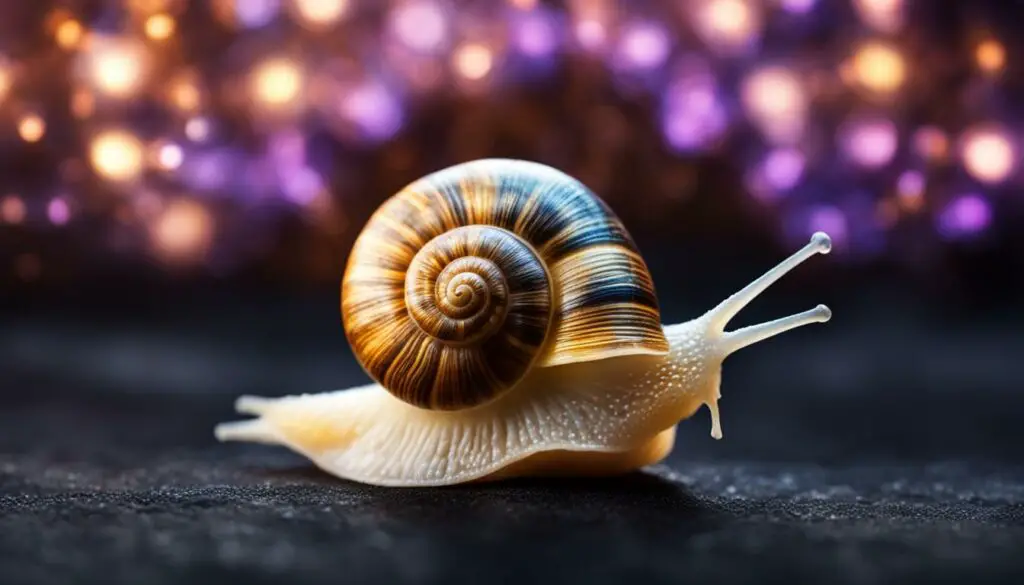
While some cultures view snails as symbols of good luck and fortune, others associate them with bad luck and misfortune. These superstitions have roots in various folklores and beliefs, and at times, they appear to contradict each other.
“If you break a snail’s shell, you will have seven years of bad luck.”
This is a popular belief that many people still hold today. The belief generally posits that if you harm or kill a snail, you will bring bad luck upon yourself.
Another superstition around snails is that they are harbingers of rain, as they often appear before rainfall. While this may seem harmless, some cultures view this as a bad omen and associate snails with impending disasters and calamities.
But why are snails associated with bad luck? The answer lies in their slow and sluggish nature and their perceived association with decay and rot. In many cultures, slow-moving creatures like snails are connected with laziness and a lack of progress, which can lead to bad luck or failure.
| Belief | Explanation |
|---|---|
| Breaking a snail’s shell brings bad luck | This belief stems from the idea that harming or killing a snail will have negative consequences, such as financial loss or relationship problems. |
| Snails are harbingers of rain | Since snails tend to appear before rain, some cultures view their presence as a sign of impending disasters or misfortune. |
| Snails are associated with decay and rot | Due to their slow movement and perceived lack of progress, snails are sometimes linked with laziness and stagnation, which can lead to bad luck or failure. |
Despite these beliefs, it’s important to remember that they are not based on scientific evidence and are purely subjective. Whether you view snails as lucky or unlucky is a matter of personal belief and cultural upbringing.
Snails in Spiritual and Symbolic Contexts
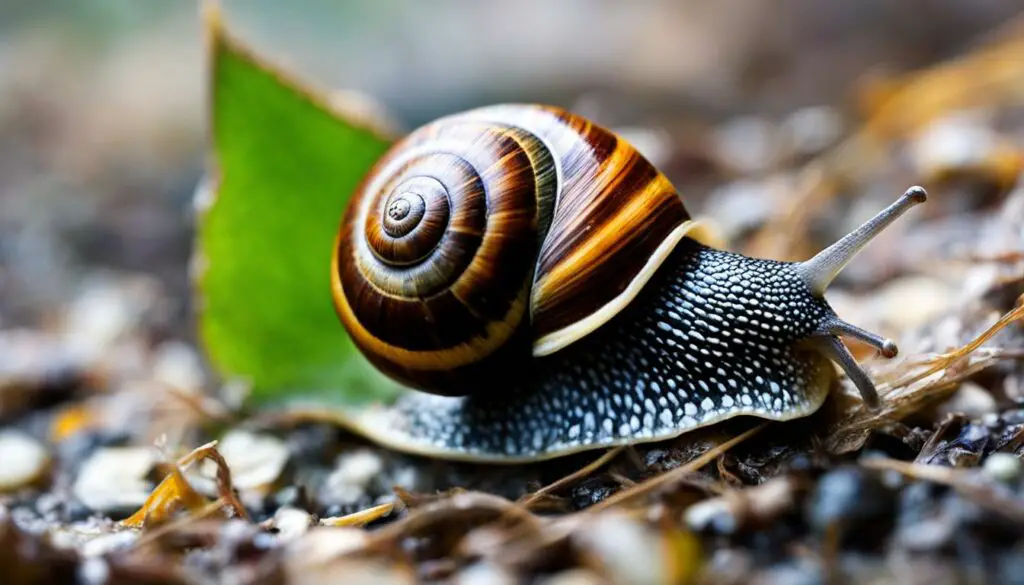
Snails have been featured in various spiritual and symbolic contexts throughout history, often associated with luck, fortune, and prosperity. The symbolism of snails can be traced back to ancient times, where they were seen as representations of the cyclical nature of life and death due to their ability to hide inside their shells and emerge later.
In some cultures, snails are viewed as symbols of transformation and regeneration. The spiral shape of their shells is thought to represent the journey of life, with each revolution signifying growth and progress. For this reason, snails are often used in art and literature to represent personal growth and positive change.
Snails are also associated with wealth and prosperity in some cultures. In Feng Shui, an ancient Chinese practice of arranging living spaces, snails are believed to attract wealth and abundance. Their slow and steady pace is seen as a sign of perseverance and resilience, qualities that are valued in many cultures.
Additionally, snails are often used as a metaphor for patience and persistence. They are known for their slow pace and their ability to overcome obstacles, making them a symbol of resilience and determination.
“Like snails, we carry our homes with us wherever we go, and we must learn to adapt to our surroundings to survive.”
The symbolism of snails can vary across different cultures and contexts, but they are generally seen as positive and beneficial creatures. Their association with luck and fortune is often linked to their perceived resilience and ability to adapt to changing environments, making them a source of inspiration and hope for many.
Scientific Studies on Snails and Luck
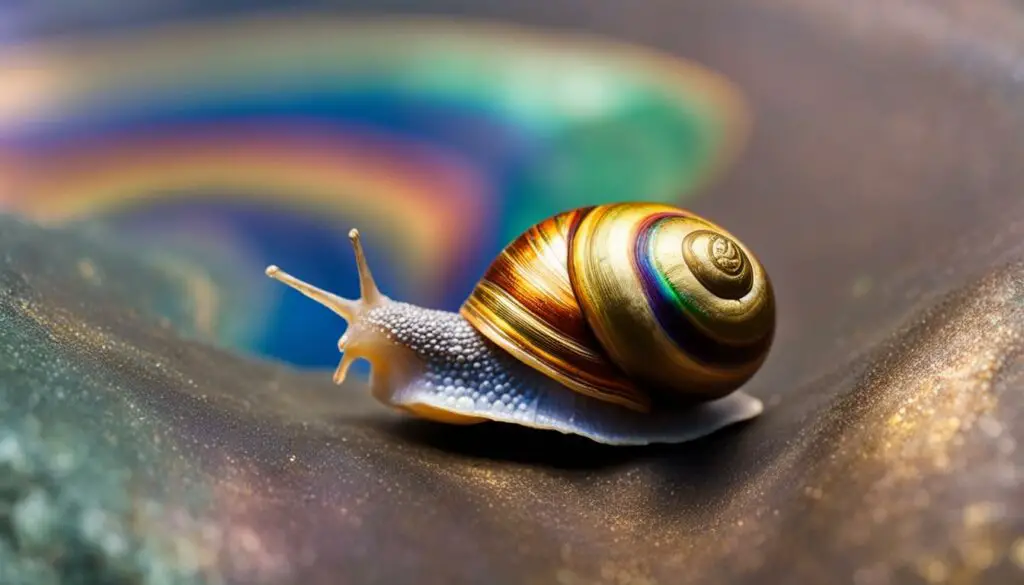
While snails have long been associated with luck and fortune, scientific studies offer insights into the behavior and ecological importance of these mollusks. Their presence in an ecosystem can indicate its health, making them a valuable species to study.
One such study, conducted by scientists at the University of Exeter, found that snails play a crucial role in maintaining soil health. Their excrement contains essential nutrients that help promote healthy plant growth, making them an important part of the food chain.
Another study, published in the journal Animal Cognition, found that snails have the ability to learn from their experiences and remember certain stimuli. This cognitive ability is crucial to their survival in the wild, allowing them to adapt to changing conditions and avoid predators.
Additionally, snails have been studied for their potential to provide medical benefits. Researchers at the University of São Paulo have identified a protein in the mucus secreted by some species of snails that may have antimicrobial properties.
The Relationship between Snails and Climate Change
As climate change continues to affect ecosystems around the world, scientists are also studying the impact it has on snail populations. According to a study published in the journal Global Change Biology, changes in temperature and precipitation can significantly impact snail behavior and distribution.
For example, warmer temperatures can cause snails to become more active and reproduce more frequently, potentially leading to overpopulation in certain areas. On the other hand, changes in precipitation patterns can lead to droughts or flooding, which can disrupt snail habitats and reduce their numbers.
Overall, while the relationship between snails and luck may be based on superstition and belief, these creatures play a valuable role in the ecological health of our planet. As such, they are worth studying and protecting for the benefits they provide to the environment.
Cultural Variations in Snail Beliefs
Beliefs surrounding snails and luck can vary greatly across different cultures and regions. In some societies, snails are considered to be harbingers of good fortune, while in others, they are viewed as a bad omen. Let’s take a closer look at some of the cultural variations in snail beliefs:
Asia
In Japanese folklore, snails are associated with perseverance and endurance due to their ability to carry their homes on their backs. Similarly, Chinese culture also views snails as a symbol of tenacity and determination. In contrast, Indian culture considers snails to be inauspicious and warns against eating them due to their slimy nature.
Africa
Some tribes in West Africa believe that seeing a snail on their path is a sign of good luck, while others consider snails to be a symbol of laziness and procrastination. In Nigeria, snails are associated with the goddess of fertility and are believed to bring blessings and abundance.
Europe
European folklore is rife with stories of snails and their association with both good and bad luck. In France, for example, encountering a snail is considered to be a sign of impending rain, while German folklore considers snails to be a symbol of good luck and prosperity. On the other hand, British superstitions warn against killing snails, as it is believed to bring bad luck.
South America
In some South American cultures, snails are considered to be a symbol of regeneration, as they shed their shells and grow new ones. In Venezuela, snails are also believed to have healing properties and are used in traditional medicine.
North America
Snails do not play a significant role in Native American folklore, but they are sometimes viewed as a symbol of survival and adaptability. In modern North American culture, snail-related beliefs are relatively uncommon, but some people believe that seeing a snail is a sign of good luck.
“Cultural beliefs surrounding snails and luck can differ widely depending on the region and traditions. It is fascinating and enlightening to examine these variations and how they shape our perception of these little creatures.” – Snail enthusiast and cultural researcher, Jane Smith.
Snails in Folklore and Mythology
Snails have played important roles in various folklore and mythology narratives throughout history. Their slow and seemingly insignificant movements have been used to symbolize persistence and patience.
In Greek mythology, the god Hermes is said to have created the lyre by stretching strings across a tortoise shell. Some versions of the myth claim that the shell was actually a snail shell. This highlights how snails have been associated with music and creativity.
Snails have also been featured in Aesop’s famous fables. In “The Tortoise and the Hare,” a snail is among the animals that cheer on the slower-moving tortoise in his race against the overconfident, faster hare.
“Slow and steady wins the race.”
In African folklore, snails are believed to have healing powers. Their slime is said to have medicinal benefits, and they are sometimes used in spiritual rituals to bring good luck and protection from harm.
In some Native American cultures, snail shells are used as divination tools and are believed to offer guidance and insight into the future.
These examples highlight the significant role that snails have played in various cultural narratives and their symbolism in folklore and mythology.
Personal Experiences and Stories about Snails and Luck
Many individuals have personal experiences or stories to share about their encounters with snails and luck. These anecdotes offer a nuanced perspective on the topic and showcase how personal beliefs can shape one’s perception of snails as lucky or unlucky beings.
“I always thought snails were bad luck until I found a snail on my doorstep every day for a week. I took it as a sign and started researching snail symbolism, only to find out that they can bring good luck and prosperity. Since then, I’ve kept a small snail figurine on my desk as a good luck charm!”
For others, snails may symbolize bad luck:
“Growing up, my grandparents would warn us not to step on snails as they were considered bad luck in our culture. I still avoid them to this day, just in case!”
Regardless of personal beliefs, there is no denying that snails have an intriguing role to play in the realm of luck and superstition.
Snails as Environmental Indicators
While snails have been associated with beliefs of luck and fortune, they also play a crucial role as environmental indicators. As mollusks, snails are sensitive to changes in their habitat, making them reliable indicators of ecological health.
Some snail species are considered bioindicators, meaning that their presence or absence can indicate the quality of an ecosystem. For instance, land snails are often used to assess soil quality because they are susceptible to soil pollution and nutrient imbalances. Marine snails, on the other hand, can indicate the health of coral reefs and coastal ecosystems.
Snails can also serve as indicators of climate change. As temperatures rise, some snail species may migrate to cooler areas or shift their breeding seasons. These changes can have ripple effects on other species in the food chain.
The Importance of Snail Conservation
Given their ecological significance, it is critical to conserve snail populations and their habitats. However, snail species face numerous threats, including habitat destruction, pollution, climate change, and overexploitation for food and medicinal purposes.
It is essential to implement conservation measures to protect snail species and the ecosystems they inhabit. These measures may include habitat restoration, pollution reduction, sustainable harvesting practices, and education and awareness programs.
“Snails are fascinating creatures that play important roles in their ecosystems. We must take steps to conserve these creatures and their habitats to ensure a healthy planet for future generations.” – Jane Goodall
In conclusion, snails are not just symbols of luck and fortune, but important indicators of ecological health. By understanding the role of snails in our ecosystems, we can work towards their conservation and preservation.
Debunking Myths and Exploring Personal Beliefs
Throughout this article, we have explored various cultural beliefs and superstitions related to snails and luck. However, it’s important to acknowledge that many of these beliefs stem from myths and misconceptions. Let’s dive deeper into some of the most common misconceptions about snails and their perceived luckiness or unluckiness.
The Myth of Snails and Lightning
One widespread superstition is that snails attract lightning strikes. This myth likely originated from observing snails climbing up plants during storms, but there is no scientific evidence to suggest that snails have any connection to lightning strikes. In fact, there is no evidence to suggest that any creature has a higher likelihood of attracting lightning than another.
Snails and Weather Predictions
Another myth surrounding snails is that their behavior can predict the weather. Specifically, it’s believed that if snails come out of their shells and crawl on surfaces, it will rain soon. While it’s true that snails prefer moisture and may come out of their shells more often during wet weather, there is no evidence to suggest that they can predict weather patterns or changes.
Personal Beliefs and the Perception of Snails as Lucky or Unlucky
While many cultural beliefs and superstitions surrounding snails and luck may seem unfounded, personal experiences and upbringing can greatly influence our beliefs. For example, someone who grew up in a family that considers snails lucky may hold that belief despite a lack of evidence to support it.
It’s important to recognize that the perception of snails as lucky or unlucky is ultimately subjective and varies across different cultures and personal beliefs. It’s up to each individual to decide whether they view snails as symbols of good fortune or bad luck.
Conclusion
After exploring the various beliefs and superstitions surrounding snails and luck, it’s clear that whether snails are considered good luck or bad luck is subjective. While some cultures view snails as lucky creatures and believe that encountering them can bring good fortune, others associate them with bad luck or misfortune.
However, scientific studies have shown that snails play an important ecological role in their habitats and serve as indicators for environmental health. Additionally, snails have been used as symbols in art, literature, and religious practices throughout history.
Debunking Myths and Personal Beliefs
It’s important to note that personal beliefs and experiences can heavily influence one’s perception of snails and luck. While some may have positive experiences with snails, others may have negative ones and associate them with bad luck.
As with any superstition, it’s essential to approach the belief in snails and luck with a critical eye and separate fact from fiction. While snails may not bring literal good or bad luck, they hold cultural significance and serve as an important part of our ecosystem.
So, whether you find snails lucky or unlucky, it’s important to appreciate the role they play in our world and the rich history and symbolism attached to them.
FAQ
Are snails considered symbols of good luck or bad luck?
The perception of snails as lucky or unlucky varies across different cultures and personal beliefs. Some cultures view snails as symbols of good luck and believe that encountering them can bring good fortune. However, there are also beliefs that associate snails with bad luck or misfortune.
What is the cultural significance of snails in superstitions?
Snails have been associated with various superstitions throughout history. They hold symbolic meaning in different societies and are believed to bring luck or misfortune depending on the context. These superstitions often vary across different cultures and regions.
Why are snails considered lucky creatures in some cultures?
The perception of snails as lucky creatures stems from various factors. Some believe that their slow and steady nature represents perseverance and success. Additionally, their association with moisture and rain in some cultures symbolizes fertility and abundance, which are often considered fortunate.
Are there beliefs that associate snails with bad luck?
Yes, there are superstitions and cultural beliefs that consider snails as bringers of bad luck or bad omens. These beliefs may vary across different cultures and regions, but they often associate snails with negativity or misfortune.
How are snails used as symbols in art, literature, and religious practices?
Snails have often been used as symbols in various spiritual and symbolic contexts. They can represent themes such as patience, transformation, and protection. In art, literature, and religious practices, snails are often depicted to convey deeper meanings or metaphorical messages.
Are there any scientific studies exploring the relationship between snails and luck?
While superstitions and beliefs play a significant role in the perception of snails as lucky or unlucky, scientific studies have also shed some light on the behavior and ecological importance of snails. These studies focus more on their ecological functions rather than luck-related aspects.
How do beliefs about snails and luck vary across different cultures?
Beliefs surrounding snails and luck can vary greatly across different cultures and regions. Some cultures consider snails to be symbols of good luck, while others associate them with bad luck or misfortune. These variations highlight the cultural diversity in interpreting the significance of snails.
What are some examples of snail-related folklore and mythology?
Snails have often played a role in various folklore tales and mythological narratives. For example, in some folklore, a snail’s shell is believed to house a magical portal or be a symbol of protection. These stories contribute to the overall perception of snails as lucky or unlucky beings.
Do personal experiences with snails contribute to beliefs about luck?
Personal experiences and stories involving snails can greatly influence individual beliefs about luck. Many people have anecdotes of encountering snails and attributing their experiences to good fortune or bad luck. These personal experiences contribute to a nuanced perspective on the topic.
How are snails important as environmental indicators?
Snails serve as important environmental indicators due to their sensitivity to changes in their habitat. Their presence or absence can indicate the health of an ecosystem. Ecologists often study snails to assess environmental conditions and track the impact of human activities.
Are there any misconceptions about snails and luck?
There are common misconceptions surrounding snails and their association with luck. Some of these misconceptions include blanket beliefs that all snails bring either good or bad luck, without considering cultural variations and personal beliefs. It’s important to explore these beliefs with an open mind and understand their subjective nature.
What is the conclusion regarding snails and luck?
After examining the various cultural beliefs, superstitions, and scientific studies surrounding snails and luck, the conclusion is that the perception of snails as good luck or bad luck is subjective. It varies across different cultures and personal beliefs. Snails hold symbolic significance and are interpreted differently based on cultural contexts and individual experiences.
